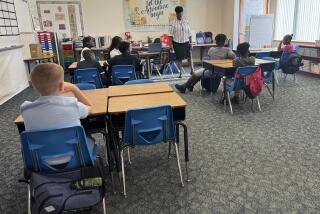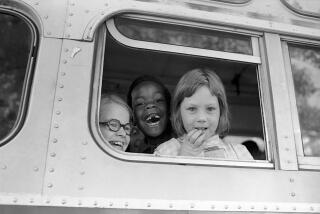Georgia students organize county’s first integrated prom
- Share via
Like many high school seniors about this time of year, Mareshia Rucker and Stephanie Sinnott ooh and aah over gowns with heart-shaped bodices and jewel-encrusted necklines.
Yet the ritual of picking a prom dress is little more than an afterthought for these teens, amid all the pressure of organizing their county’s first integrated prom.
Rucker is black and Sinnott is white. More than 40 years after the Supreme Court ordered school integration, the two classmates are pushing one of south-central Georgia’s slowest-moving counties to overturn a long-standing tradition of segregated proms.
“We sit in class together; we sing in choir together,” Sinnott said. “Why can’t we go to the same prom?”
Wilcox County is one of the last remaining pockets of the rural South where classmates mark the end of high school with racially separate celebrations.
“I know it’s implausible,” said Steve Smith, superintendent of Wilcox County’s struggling school system, which is so underfunded that students attend classes only four days a week. “I’m not sure there’s a legitimate answer.”
Ever since the school system integrated in 1971, parents have organized invite-only proms. Operated outside the school, the proms are called private parties.
“They tell the media it’s just a ‘private party,’” Rucker, said, laughing. “But they don’t talk about their ‘private party dresses’!”
“They don’t talk about their ‘after-private party party,’” Sinnott chimed in. “Or ‘private party shoes’!”
The girls joke in part to deal with the awkwardness. No one in this poor, remote county, where a few small towns sit amid fields of cantaloupe and cotton, expected the students’ campaign to go viral, generating support from as far as Australia and South Korea. There was shock when news crews rolled in from Macon, Ga., 60 miles away.
Then the prom became political theater, with a progressive advocacy group, Better Georgia, pressing state lawmakers to endorse the integrated party. A spokesman for Republican Gov. Nathan Deal generated national headlines when he dismissed Better Georgia as a “leftist front group” and declined to “lend a hand to their silly publicity stunt.”
An uneasy tension hangs over Wilcox County High School, enrollment 380. Although more than 100 students have bought tickets for the integrated party — about three times as many as for the white one — organizers say some classmates avert their eyes as they pass in hallways. Many students are suspiciously polite.
Even white friends who came to a fundraiser for the integrated prom asked the organizers not to share pictures of them at the event; they didn’t want their parents to know they’d crossed the railroad tracks into the black side of town.
Many students were still weighing which party to attend — the white prom this Saturday or the integrated prom April 27. Some are considering skipping both proms; a few plan to attend both.
“For me, it’s about being with my friends, not having a racial debate,” said Wesley Helms, 17, a junior who’s trying to navigate the uncomfortable experience of being on the white prom committee and attending the integrated prom. Watching friendships fray, he said, has gotten kind of old.
Pausing in the school parking lot at the end of a long school day, Khadijah Childs, 19, an African American senior, contemplated all the layers of anxiety and pressure to conform. While many white parents seem nervous as their kids listen to the rap music of Young Jeezy and Waka Flocka Flame, she said the judgment goes both ways, with blacks ridiculing her for listening to country stars like Luke Bryan and Jason Aldean.
“They say I act like white folk!” she said with a laugh.
Outside the football stadium, near a sign asking spectators not to spit tobacco, the white coaches took turns ribbing Kameon Peavy, a 17-year-old African American linebacker who has tickets for the integrated prom:
“Hey Kameon, will you guys stop your booty dancing when they put on the country music?”
“Kameon, I don’t mind if you dance with my daughter, as long as you’re this” — a coach stretched his arms wide — “far apart.”
Peavy smiled good-naturedly, his eyes darting to the asphalt.
When his coaches moved out of ear shot, he said yes, he dated white girls, but he didn’t expect them to tell their parents. “That’s just part of living in the South,” he said with a shrug.
Next year, when he graduates, he hopes the school sponsors an integrated prom. “It just makes sense,” he said. “It would be taking a step forward out of this racist society.”
More to Read
Sign up for Essential California
The most important California stories and recommendations in your inbox every morning.
You may occasionally receive promotional content from the Los Angeles Times.











